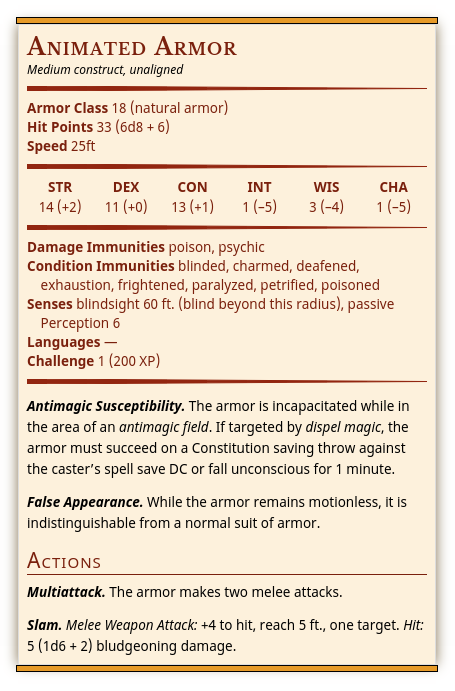A Web Component statblock for D&D 5E
Statblock5e provides an easy way to display a creature statblock that looks almost exactly like the statblocks from the 5th edition D&D Monster Manual.
This is implemented as a set of custom elements following the Web Components specs: HTML Imports, Custom Elements, Shadow DOM and the HTML5 template element.
Since Chrome is currently the only browser that implements all of the above specs, statblock5e only works in Chrome. Make sure you are using at least Chrome 45. (Firefox is close to providing all the necessary support but it's all behind flags.)
There are no dependencies (JavaScript or otherwise), this is entirely self-contained.
There's very little JavaScript actually; just a bit of boilerplate that registers the elements and some minor logic for computing the ability modifiers for the ability table. Other than that, it's pure HTML, CSS & SVG.
Here's the markup that produced the above picture. No user-level CSS or JavaScript is necessary.
<stat-block>
<creature-heading>
<h1>Animated Armor</h1>
<h2>Medium construct, unaligned</h2>
</creature-heading>
<top-stats>
<property-line>
<h4>Armor Class</h4>
<p>18 (natural armor)</p>
</property-line>
<property-line>
<h4>Hit Points</h4>
<p>33 (6d8 + 6)</p>
</property-line>
<property-line>
<h4>Speed</h4>
<p>25ft</p>
</property-line>
<abilities-block data-str="14"
data-dex="11"
data-con="13"
data-int="1"
data-wis="3"
data-cha="1"></abilities-block>
<property-line>
<h4>Damage Immunities</h4>
<p>poison, psychic</p>
</property-line>
<property-line>
<h4>Condition Immunities</h4>
<p>blinded, charmed, deafened, exhaustion, frightened, paralyzed,
petrified, poisoned</p>
</property-line>
<property-line>
<h4>Senses</h4>
<p>blindsight 60 ft. (blind beyond this radius), passive Perception 6</p>
</property-line>
<property-line>
<h4>Languages</h4>
<p>—</p>
</property-line>
<property-line>
<h4>Challenge</h4>
<p>1 (200 XP)</p>
</property-line>
</top-stats>
<property-block>
<h4>Antimagic Susceptibility.</h4>
<p>The armor is incapacitated while in the area of an <i>antimagic
field</i>. If targeted by <i>dispel magic</i>, the armor must succeed
on a Constitution saving throw against the caster’s spell save DC or
fall unconscious for 1 minute.</p>
</property-block>
<property-block>
<h4>False Appearance.</h4>
<p>While the armor remains motionless, it is indistinguishable from a
normal suit of armor.</p>
</property-block>
<h3>Actions</h3>
<property-block>
<h4>Multiattack.</h4>
<p>The armor makes two melee attacks.</p>
</property-block>
<property-block>
<h4>Slam.</h4>
<p><i>Melee Weapon Attack:</i> +4 to hit, reach 5 ft., one target.
<i>Hit:</i> 5 (1d6 + 2) bludgeoning damage.</p>
</property-block>
</stat-block>The example text is copyright Wizards of the Coast; they make it available for free on their website through the D&D 5E Basic Rules (it's in the DM supplement).
Visual differences from the MM statblocks
Unfortunately this statblock isn't quite pixel-perfect with regards to the statblocks in the MM. The differences are:
- Different typefaces used. I'm told that the body typeface used in the MM is FF Scala Sans and the one used for the monster name headings is Mrs Eaves Petite Caps. They're not available for free from Google Fonts, so substitutes are used instead.
- No textured background. Obviously, I don't have access to the original textures WotC used. Even if I did, I'm not sure I'd use them since that would mean serving images which I wanted to avoid (scaling/resolution/deployment issues etc).
- No textured block border. Same as above.
There are probably other differences as well but I haven't noticed them. I tried to stick as close to the original as reasonably possible; for instance, I spent waaay too much time getting the drop-shadow to be the "correct" shade of brown and the tapered horizontal rule to render just right. Why? Because I had nothing better to do and it was fun! :)
FAQ
Is there a single-file version?
The demo.html file in the repository HTML-imports the other HTML
source files. There's also demo-inlined.html which renders
exactly the same but has all the HTML-imports inlined directly into the
document.
The Python script that produces the inlined version is also available.
How do I make two-column layouts?
See the demo-two-column.html file (here's a rendered
image). The key thing to notice is the use of the data-two-column
attribute on the <stat-block> element. You can also use the
data-content-height attribute to tweak the layout. See the
comments in the demo file for details.
Why aren't you using polyfills?
While polyfills for Web Components do exist, they're not perfect and
require a preprocessing stage that inlines all HTML imports and rewrites the new
CSS selectors like :host, ::content, /deep/ etc. There's no easy way to
tie all this together and frankly, I don't care enough since I'll personally
only use this for locally hosted pages rendered in Chrome.
If someone wants to do the required work to implement the whole preprocessing pipeline, pull requests are welcome.
Version History
0.0.4
- Fixed issue with text floating outside the statblock on Chrome 50+.
0.0.3
- Simpler way of supporting two-column layout.
0.0.2
<property-line>can now be used for legendary actions since it doesn't hardcode red text.- Support for two-column layout! See the new item in the FAQ.
- Now supporting multiple
<p>elements inside<property-block>. All<p>'s after the first will have an indent like in the MM. - Increasing h3 size to be closer to MM.
- Increasing line height of body font to be closer to MM.
- Using a new typeface for monster name heading. Should be closer to MM.
- Slightly increased body font size to be closer to MM font metrics.
0.0.1
- Initial release.
License
This software is licensed under the Apache License, Version 2.0.
